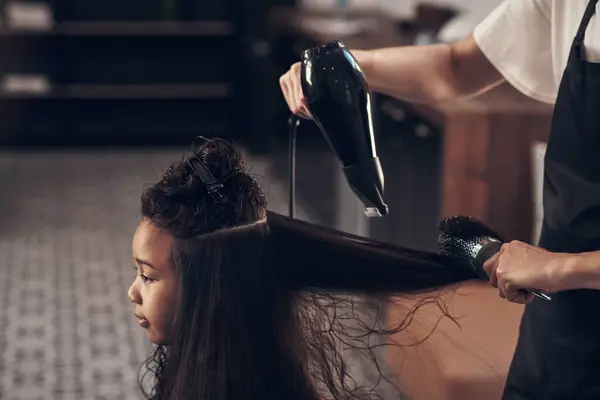Are you looking for money you will make for owning or operating a salon business in Kenya?
The beauty industry in Kenya continues to grow due to the high demand for hair, beauty, and skincare services. This makes a salon one of business ideas that never fails in Kenya. It can give you a lot of income with the right location, quality services, and marketing.
This post will teach you about essential aspects of launching and managing a successful salon. We’ve compiled answers to 23 common FAQs that will equip you with the knowledge needed to navigate this exciting venture.
1. What is the average profit of a hair salon?
Salon owners can earn between Ksh 2,000 to Ksh 10,000 daily. This translates into monthly earnings ranging from Ksh 60,000 to Ksh 300,000. Earnings depend on client volume and service variety. Establishing strong customer relationships through excellent service delivery can lead to repeat business and referrals—key drivers of profitability.
The average profit margin for hair salons can vary widely based on location, services offered, and management efficiency. In Kenya, particularly in urban areas like Nairobi, salons typically see profit margins ranging from 16% to 30%. A small-scale salon in estates might earn around Ksh 16,000 monthly, while larger salons can generate significantly more, depending on their clientele and service variety.
Factors such as effective marketing, customer retention strategies, and the ability to upsell services also play crucial roles in enhancing profitability. For instance, salons that offer diverse services—like haircuts, coloring, and spa treatments—tend to attract a broader customer base, thereby increasing potential earnings.
2. How much do I need to start a salon business in Kenya?
Starting a beauty shop in Kenya requires varying amounts of capital based on the size and scope of the business.
- Small salon, an initial investment of Ksh 50,000 to Ksh 100,000 is generally sufficient.
- Medium-sized salons may require between Ksh 100,000 and Ksh 500,000,
- Larger establishments can need upwards of Ksh 500,000 to Ksh 2 million.
This budget should cover essential expenses such as equipment (chairs, styling tools), rent for the salon space, initial product inventory (shampoos, conditioners), and legal permits. It’s advisable to conduct thorough market research to determine the specific costs associated with your desired location and service offerings.
Breakdown of Costs:
- Rent and deposit: Ksh 50,000–200,000.
- Equipment: Ksh 150,000–500,000.
- Products and supplies: Ksh 50,000–200,000.
- Licenses and permits: Ksh 20,000–50,000.
3. What makes a hairdressing business profitable?
Profitability in a hair salon hinges on several key factors.
- Service Diversity: Offering a wide range of services such as haircuts, coloring, manicures, and facials can attract more clients.
- Location: A salon located in a high-traffic area or near shopping centers tends to have more walk-ins.
- Customer Service: Exceptional service fosters client loyalty and encourages word-of-mouth referrals.
- Effective Marketing: Utilizing social media platforms and local advertising can significantly enhance visibility and attract new customers.
Additionally, establishing loyalty programs or special promotions can incentivize repeat business, further boosting profitability.
4. Is a hair salon business profitable in Nairobi?
Yes, a hair salon business can be quite profitable in Nairobi due to the city’s vibrant beauty culture and growing middle class that seeks grooming services. Salons in urban areas often experience high demand for various services ranging from basic haircuts to advanced treatments like coloring and styling. The average earnings for salon owners can range from Ksh 60,000 to Ksh 300,000 monthly based on clientele volume and service diversity. However, success depends on factors such as location choice, service quality, effective marketing strategies, and customer relationship management.
5. What equipment is needed to start a salon Business?

Essential equipment includes hairstyling chairs, shampoo bowls, hairdryers, styling tools (scissors and combs), mirrors for client viewing, towels/capes for hygiene purposes, and an inventory of beauty products used during treatments Here’s a list of essential salon equipment along with their approximate prices in Kenya:
| Equipment | Estimated Price (Ksh) |
|---|---|
| Hairdressing Chairs | 25,000 |
| Hair Dryers | 15,000 |
| Shampoo Bowls | 10,000 |
| Styling Tools (scissors) | 30,000 |
| Towels & Capes | 5,000 |
| Mirrors | 10,000 |
| Product Inventory | 20,000 |
Total estimated investment: approximately Ksh 115,000.
Recommended Suppliers in Nairobi:
- River Road for affordable equipment.
- Online stores like Jumia and beauty suppliers such as Nakshi Creations and BestLady.
6. How do I Make a Hairdressing business plan?
A hairdressing business plan outlines your vision for your operations. A solid plan is essential for securing financing or investors. It includes various sections including;
- Market analysis (target customers and competitors).
- Financial projections (startup costs and revenue).
- Marketing strategies (client attraction and retention).
- Service offerings and pricing.
- Operational plans (staffing and daily operations).
7. What are the legal requirements for starting a salon in Kenya?
To legally operate a beauty in Kenya you must register your business with the relevant authorities (e.g., Registrar of Companies), obtain necessary licenses from local authorities (such as health permits), comply with tax regulations by registering with the Kenya Revenue Authority (KRA), and ensure adherence to labor laws if hiring staff. Assuming your operations are in Nairobi County, you’ll need:
- Business Registration Certificate: Register your business name via the eCitizen platform.
- County Business Permit: Obtain this from the Nairobi City County office.
- Health and Safety Compliance: Ensure your premises meet hygiene and safety standards, often verified by health inspectors.
- Fire Safety Certificate: A requirement to confirm your salon adheres to fire safety regulations.
8. How do I hire and train staff for my salon?
Hiring staff involves creating clear job descriptions outlining required skills and experience levels for positions like hairstylists or receptionists. Advertise openings through online job boards or local community centers. Training should focus on both technical skills (hair cutting/styling techniques) and customer service excellence—consider offering mentorship programs or workshops led by experienced professionals.
9. What challenges do hairdressers in Kenya face?
Common challenges include high competition due to numerous salons existing within urban areas like Nairobi; managing operational costs including rent; retaining skilled staff; adapting to changing beauty trends; maintaining customer satisfaction; and navigating economic fluctuations affecting consumer spending.
10. What are the best locations for a Hairdresser Business in Nairobi?
Ideal locations for salons include high-traffic areas such as shopping malls (e.g., Sarit Centre or Yaya Centre), busy streets with good visibility (like Westlands or CBD), residential neighborhoods with growing populations (like Kilimani or Lavington), or near corporate offices where professionals seek grooming services during lunch breaks or after work hours.
Best Locations for a Salon in Nairobi
The location of your beauty parlor is one of the most critical factors in determining its success. Here are the top considerations:
- High-Traffic Areas
Locations like shopping malls, market hubs, and busy streets offer a steady flow of potential clients. Some of the best areas include:- Westlands
- Kilimani
- CBD (Central Business District)
- Ngong Road
- Residential Areas
Upscale neighborhoods like Karen, Lavington, and Runda are ideal for premium salons targeting high-income clients. - Accessibility
Choose locations with ample parking, good public transport connectivity, and visibility from the main road.
Tip: Conduct a market survey to understand the needs of your target clientele before settling on a location.
11. How can I market my salon effectively in Kenya?
Effective marketing strategies include leveraging social media platforms like Instagram or Facebook to showcase your work; offering promotions or discounts during openings; collaborating with local influencers; creating referral programs that reward clients who bring new customers; participating in community events; and maintaining an engaging website that highlights services offered along with client testimonials.
How to Market Your Beauty Shop Effectively in Kenya
Marketing plays a significant role in attracting and retaining clients. Here are proven strategies:
- Leverage Social Media
- Create an active presence on platforms like Instagram and TikTok.
- Post before-and-after photos of client makeovers.
- Share hair care tips and tutorials.
- Referral Programs
Encourage your existing clients to refer new customers by offering discounts, free services, or loyalty points. - Partnerships
Collaborate with beauty product brands for exclusive promotions or co-hosted events. - Local Advertising
Use posters, flyers, and local newspapers to create awareness in your target area. - Special Offers and Promotions
Seasonal discounts, back-to-school packages, or bridal packages can draw new clients.
12. What attracts clients to a salon?
Clients are attracted by several factors including quality service delivery; friendly staff who create welcoming atmospheres; cleanliness of the establishment; competitive pricing; availability of diverse services; effective marketing strategies showcasing unique offerings; positive reviews from previous clients; loyalty programs rewarding repeat visits; and convenient locations that are easily accessible
13. How can I market my salon effectively in Kenya?
Effective marketing strategies include leveraging social media platforms like Instagram or Facebook to showcase your work; offering promotions during openings; collaborating with local influencers; creating referral programs; and participating in community events.
14. How can I stay competitive in the salon industry?
To remain competitive:
- Continuously update your skills and offer the latest beauty trends.
- Invest in modern equipment and maintain a clean, inviting space.
- Build strong customer relationships through loyalty programs.
- Regularly engage clients through social media and promotions.
15. What are common mistakes to avoid when starting a salon?
- Failing to research the market.
- Overlooking hygiene standards.
- Underestimating startup costs.
- Ignoring customer feedback.
16. How do I manage salon finances effectively?
To avoid financial pitfalls:
- Use accounting software like QuickBooks or Wave.
- Separate business finances from personal expenses.
- Track revenue and reinvest a portion into improving your salon.
Pro Tip: Consider hiring a professional accountant to handle taxes and ensure compliance with Kenyan tax laws.
17. What services should my salon offer?
The services you provide depend on your target market. Specializing, such as focusing on bridal hair and makeup, can help you stand out in the market. However, offering diverse services attracts a wider clientele.
Essential Services:
- Haircuts, styling, and coloring.
- Nail care: Manicures and pedicures.
- Skin treatments: Facials, waxing, and makeup application.
Specialized Services (for premium clients):
- Spa treatments like massages.
- Bridal packages.
- Hair extensions and wig installations.
18. Is there a peak season for Hair Styling in Kenya?
Yes, demand spikes during the festive season, weddings, and back-to-school periods. These periods usually coincide with the April Easter holidays and December Christmas holidays.
19. Can I run a hairdressing business from home?
Yes, but you’ll need to comply with health and safety regulations and obtain a business permit from your local county office. You can also consider mobile salon services by visiting clients in their homes or offices for beauty services.
20. What trends should I focus on in the beauty industry?
Stay updated on trends like organic beauty products, men’s grooming, and tech-enabled services like online booking systems.
21. How long does it take to set up a salon?
Setting up a salon typically takes 2–4 months, depending on factors like finding a location, securing permits, and renovations.
22. How do I price my Hair Dressing services?
Research your competitors to understand market rates. Factor in costs like rent, products, and labor when setting prices.
23. Do I need prior experience to start a salon?
While prior experience is helpful, it’s not mandatory. You can hire skilled professionals and focus on managing the business.
Conclusion
Starting a salon business in Kenya offers exciting opportunities for growth and profitability if approached strategically. By understanding market dynamics, legal requirements, and best practices for attracting clients, you can create a successful venture that meets the growing demand for beauty services. Armed with the insights provided in this post, you’re now better prepared to embark on your journey toward launching your own salon business. Embrace the challenges ahead with confidence—your success story begins now!



